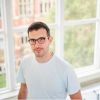
Colum Dillon
- Course: BA International History and Politics
What made you want to apply to your course and to Leeds?
I have always wanted to come to university, but I never had the opportunity. As soon as I left high school I was straight into work. I’ve now returned 12 years later as a mature student and coming to University was the best decision of my life.
History has always been a passion of mine, particularly history of the 20th century. It’s a period in which nothing was done is half measures: world wars, decolonisation and the collapse of empires, the moon landing, nuclear showdowns and not to mention a whole load of assassinations.
Leeds stood out to me for a variety of reasons. One of my main motivations for coming to university was to open up career and employability options. The University of Leeds is a world renowned Russell Group University, the level of support and guidance is fantastic. After hearing about the excellent experiences of friends who studied at the University choosing anywhere else was never a consideration.
What is it that makes you passionate about International History and Politics?
International History & Politics is history that is very much still alive. Even in today’s news we can witness the repercussions of events that happened in the twentieth century. International History & Politics provides understanding and explanations for today’s events by examining the continuities and changes. The IHP course at the University also presents a unique opportunity to be educated by experts in their field.
Which IHP modules have you particularly enjoyed studying, and why?
Two modules stand out for me: Skills and Concepts in International History and Consensus and Contention: Investigations in International History. The Skills and Concepts module was a historiography module that focuses on a single text in order to build foundational historical skills and analysis. The text my class focused on was Christopher Clark’s Sleepwalkers and examined the First World War broke out. The complexities and drama of the crisis was really brought to life by Dr Adam Richardson the class tutor.
Which Discovery Modules have you studied, and how do you feel they have enhanced your time in Leeds?
I decided to branch out from history and try something different. So I naturally took Introduction to Digital Photography and a beer brewing module. Taking these modules have provided me with valuable life skills, such as how to make my own beer, but they also introduced me to some incredible fellow students.
Both these modules enabled me to broaden my experience at Leeds.
What would you say about the library and study facilities at the University?
Everything I have ever needed can be found in either the Brotherton, Laidlaw or Edward Boyle Libraries.
The Skills@library team provide second-to-none support in all areas of academic work. Their workshops for critical thinking, essay writing, and exam preparation have been invaluable, and they have contributed towards my success at studying history.
What activities have you been involved in outside of your course and what have you got out of being involved?
I volunteer for Lotherton Hall a heritage site in Aberford. My responsibility is to build a digital family tree of the Gascoigne family whose genealogy date back to the Norman invasion 1066. So far it has been an incredible experience in which I have got my hands on some unique primary source material, and managed and organised my own research project.
I definitely recommend volunteering as it has provided me with work and experience in museum and heritage sector along with research, organisation and communication skills. All of which improve my employability.
What would you say about Leeds as a city and how do you think it has helped you make the most of your time here?
I have lived in Leeds all my life, so I’m fairly familiar with it. Over the past few years Leeds has really bloomed. Not only does it have some of the best bars, but also the quality of restaurants, shopping and venues is amazing. There is so much to explore and discover in Leeds, it’s great.
Do you have any comments about the support you receive from the School of History?
The careers centre is simply superb. I received 1-2-1 support for an upcoming interview, and through their advice, I got the job.
What do you plan to do once you’ve finished your course, and how do you think the skills and knowledge you’ve developed at Leeds will help with these plans?
My goal at the moment is to step into civil service, preferably the Foreign Office. The University of Leeds and the School of History have given me the self-confidence to pursue my goals which were previously out of bounds.

